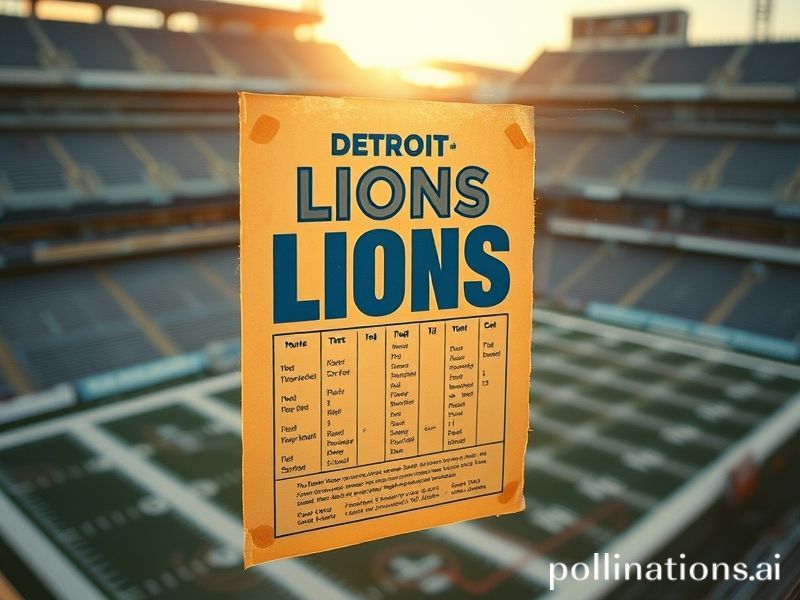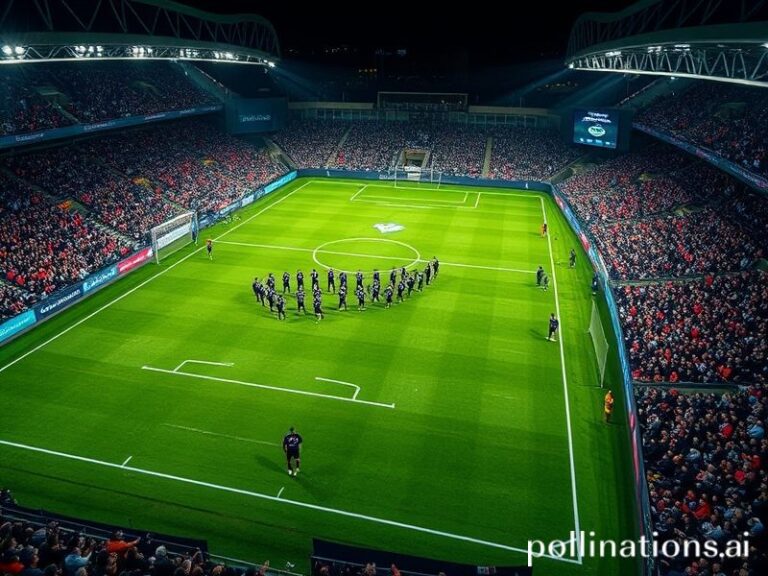Global Yawns & Gridiron Dreams: The Lions Schedule as a 24-Time-Zone Tragedy
The Lions Schedule, or How I Learned to Stop Worrying and Love the 3 a.m. Kickoff
By Dave’s International Desk
Geneva, Switzerland – While the rest of the planet frets over ballistic missile trajectories and the precise temperature at which coral turns to bone meal, a quieter, more civilized form of global coordination is unfolding: the release of the Detroit Lions’ 2024 NFL schedule. On the surface it’s a tidy table of sixteen Sundays (plus the odd Thursday when the league pretends to care about player ligaments). In practice, it is a Rosetta Stone of geopolitical fatigue, late-stage capitalism, and the human desire to watch large men concuss each other for territorial gain.
In Nairobi, the Lions–Chiefs opener will air Monday at 3:05 a.m. EAT. Local fans—mostly insomniacs and American embassy staff—will gather around flickering hotel bars nursing Tuskers while the Kenyan night guards outside wonder why anyone would voluntarily surrender sleep for a team whose last championship predates the Mau Mau uprising. The game’s broadcast rights, sold by the NFL to a pan-African streaming middleman headquartered in Dubai, are priced at roughly the weekly wage of a Nairobi Uber driver. This is called “growing the game internationally,” which is corporate argot for: we’ve run out of Americans willing to fork over $300 for nosebleeds.
Across the Mediterranean, Rome’s sports pubs will air the Thanksgiving Day tilt against Green Bay at 6:30 p.m. local—perfect aperitivo hour. Italian fans will sip spritzes and debate whether Dan Campbell’s fourth-down gambles are bold or merely proof that American optimism survives only because it is inadequately insured. The broadcast will be interrupted every twelve minutes by adverts for luxury SUVs no Roman can wedge into an alley built in 1587, a reminder that the NFL’s global strategy relies on selling Detroit grit to people who think Detroit is a type of cheese.
Tokyo presents the most exquisite absurdity. The Week 10 matchup at Los Angeles kicks off at 9:05 a.m. JST—smack in the middle of the Monday morning salaryman stampede. Carriages on the Yamanote Line will glow with illegal streams on cracked iPhones; middle managers will feyly hide earbuds beneath surgical masks, praying nobody notices they’re cheering for a franchise whose mascot is literally a defeated apex predator. If the Lions somehow win, the ensuing bowing etiquette crisis—celebrate too loudly and dishonor the collective commute—could fracture the very concept of wa. Roger Goodell remains characteristically unconcerned.
The schedule’s real achievement is logistical: it synchronizes 32 fan bases across 200 time zones (give or take) without once acknowledging that climate change is turning September games into swamp saunas and January playoffs into cryogenic experiments. Instead, the league offers soothing corporate bromides about “resilience” and “football weather,” as though the melting Arctic were merely a new special teams wrinkle.
Yet the global diaspora tunes in, partly for nostalgia, mostly for the exquisite communal pain that comes from caring about a team whose historical record reads like a Chekhov play with shoulder pads. Somewhere in São Paulo, a fan wearing a vintage Barry Sanders jersey will watch the Week 14 Saturday special at two in the morning, screaming Portuguese curses at a defense that folds faster than Argentine fiscal policy. He will wake up four hours later to sell artisanal coffee to gringos who pronounce “Goff” as if it were an Icelandic volcano. The circle of late-capitalist life closes.
And so the Lions schedule is revealed to be more than a calendar; it is a planetary clock, reminding us that no matter where we live, we are all equally capable of arranging our circadian rhythms around the misfortunes of a franchise from a city half of us cannot reliably locate on a map. That, dear reader, is the truest form of international unity we have left—sleepless, broke, and irrationally hopeful that this, finally, is the year the Lions win the NFC North. Spoiler: it isn’t. But like climate summits and cease-fires, the ritual is the point.
Kickoff approaches. Set your alarms, or don’t. History suggests the result will be the same either way, and the planet will keep spinning—slightly wobblier each season, but still spinning—until the next schedule drop gives us all something fresh to fail at together.







